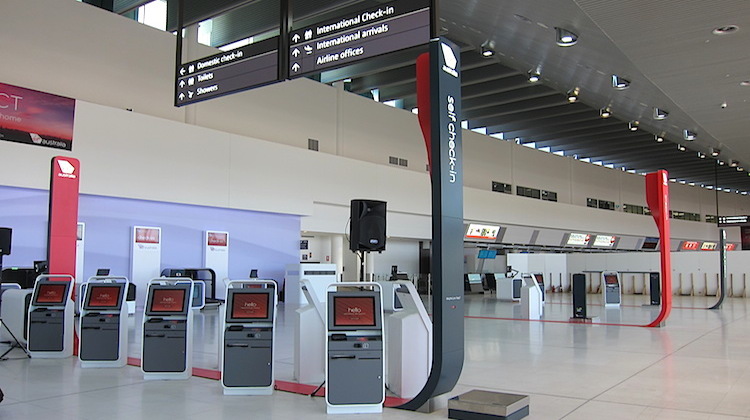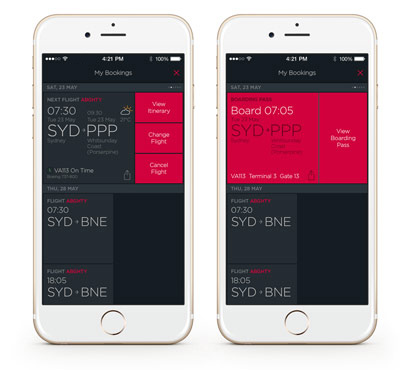
Virgin Australia group executive for airlines Rob Sharp says technology is key to easing the trademark pain-points of the travel experience that have long been the bugbears of passengers.
Speaking to a Trans-Tasman Business Circle event in Sydney on September 27, Sharp told guests recent innovations represented just the start of what the future of travel was going to look like, namely “seamless, tailored and multi-channelled”.
“Regardless of whether you are travelling for business or for a holiday break, there is one common theme that is becoming more prevalent within the travel industry – which is for operators to identify technological solutions to the common travel frictions experienced by our guests,” Sharp said in prepared remarks.
These technological solutions, both for on-the-ground infrastructure at airports and digital infrastructure for passengers before they turn up for their flight, seek to offer more self-service options for travellers.
Virgin Australia unveiled its self-service airport concept in 2015 when the airline opened the doors to its new home at Perth Airport.
Located on the eastern side of the airfield at Terminal 1, the facility featured hybrid desks developed by technology provider SITA that can switch from a self-service bag drop setup to being a manned checkin counter within five minutes.
This would allow the airline the flexibility to cater for the demands of different customers, as well as better manage operations in peak and off-peak times of the day. There are also 28 self-service checkin kiosks for travellers to print boarding passes and baggage tags.
Virgin Australia rolled out a similar proposition for travellers at Adelaide Airport in February 2018.
Then, in August 2018, it commenced construction on a major overhaul of its facilities at Melbourne Tullamarine.
Sharp noted the results of a 2017 International Air Transport Association (IATA) survey of 10,000 passengers where 82 per cent of respondents preferred to use a digital passport on their smartphone, 64 per cent preferred to use biometrics at checkin and 72 per cent preferred self boarding gates.
“Self-service is the way of the future as it eliminates queuing and congestion at the check-in halls and provides our guests with more flexibility,” Sharp said.
“Self-service technology also frees up our team members on the ground to be able to provide more of a concierge service to our guests, which further complements the overall travel experience.
“Our guests are becoming more tech-savvy and this has motivated airlines such as Virgin Australia to utilise technology in order to streamline the travel experience.”
Both Adelaide Airport and Melbourne Tullamarine will also include new premium passenger lounges as part of the renovations.
VIDEO: A “fly-through” look at Virgin Australia’s facilities at Perth Airport’s Terminal 1 in November 2015 from the airline’s YouTube channel.
Knowing its passengers better through technology
In addition to helping its passengers move through the airport more efficiently, Sharp said Virgin Australia is also leveraging the power of new technologies such as artificial intelligence and machine learning to gain more insights into its passengers.
One example of this was the voice-controlled Amazon Alexa, which is able to look up the status of a Virgin Australia flight and bring up a person’s frequent flyer details when prompted.
Meanwhile, Sharp said the airline is using machine learning technology to improve its apps, with the aim of making the travel experience more intuitive by presenting the “next best action for you” such as automatically opening up the boarding pass on a person’s smartphone when they are at the gate.
Virgin Australia is also working on integrating its apps with those of its partner airlines, with Sharp mentioning Delta Air Lines, Etihad Airways, Hainan Airlines and Singapore Airlines, in 2019.
“This means that when you are on a Delta Air Lines flight in America travelling to Australia, the embedded Virgin Australia App functionality will be able to open up to enable check-in and seat selection,” Sharp explained.
“Artificial intelligence allows airlines such as Virgin Australia to get to know its guests and their typical
travel behaviours, which in turn allows us to tailor your travel experiences.
“When we are talking about making travel easier, what we are really talking about is making modes of travel more intelligent. And by intelligent, I am meaning more connected, more personalised and multisensory.
“It goes without saying that the airlines who quickly adapt to the shifting dynamics of customer engagement will thrive in the modern travel market which is centred around apps, chatbots and other gadgets that further exemplify the 24/7 industry that we operate in.”

Sharp said the functionality such as three-dimensional airport maps have been added to the Virgin Australia app, while being able to share flight details with friends and family was expected to be available by October.
And looking further ahead, Sharp said there were also plans to offer new payment options and better notification alerts, as well as augmented reality way finding within airports such as Los Angeles.
“There is extensive investment in our app-based approach due to the fact that our guests are empowered by apps – they want direct control over their bookings and have higher expectations in terms of being notified with travel updates too,” Sharp said.
Sharp noted 16 million customers visited the Virgin Australia website via their mobile device in the 12 months to June 30 2018, which demonstrated the “reliance on this mobile technology to access information and streamline the travel process”.
“Travellers now expect to be able to use their phones as a key tool in the travel process – checking-in for flights, accessing boarding passes, as well as being alerted to travel disruptions,” Sharp said.
“Smart phone technology has seen a major shift in traveller behaviour which has acted as an impetus for airlines to up the ante on our customer engagement strategies, which is seeing flow-on benefits to the overall travel experience.”
Virgin Australia is also rolling out inflight internet Wi-Fi across its domestic and international fleet.




